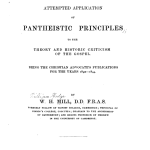
(Wikimedia Commons photo by Mohammad Nowfal)
The worst sin in Islam is shirk (شرك). The word isn’t pronounced like the English verb to shirk, as in “shirking one’s responsibilities.” Rather, it’s pronounced exactly like the English adjective sheer — or, if you prefer, like the English verb to shear, as in “shearing a sheep” — except that there’s a k at the end.
The term shirk is often rendered as polytheism or even idolatry. And, roughly, that’s probably alright. Relatively adequate. Accordingly, a mushrik is a polytheist or an idolater.
But it’s not precisely correct.
The fundamental meaning of the Arabic root sh-r-k is something like “association” or “sharing.” Thus, there are cognate words such as Modern Standard Arabic sharika, “company” (or, in Egyptian colloquial Arabic, shirka); mushtarik, “shared” or “mutual”; ishtirakiyya, “sharing” or “socialism”; and so forth.
With that semantic background in mind, shirk in theological usage is probably best understood, basically, as associating something else with God in the sense that that something else is regarded as sharing in God’s status or as worthy of worship alongside God.
Polytheism obviously fits this understanding, as does idolatry.
Historically, many Muslim thinkers have been suspicious (at best) of Christian Trinitarianism, considering it close to shirk if not altogether guilty of the sin. And the protests of mainstream, orthodox Trinitarian Christians that they are monotheists who, while not confusing the persons (in affirming the deity of Father, Son, and Holy Spirit) nevertheless do not divide the divine substance have not fully convinced those Muslim thinkers. For Islam truly is monotheistic, and rigorously so, just as at least the past two or three millennia of Judaism have been. And, also speaking historically, Muslims have been very good at mathematics. When they hear of Father and of Son and of Holy Spirit, they can easily count up to three.
The term shirk is, however, also applied (somewhat) metaphorically to other kinds of “polytheism,” such as disproportionate devotion to wealth, status, and power. In that sense, some recent Muslim thinkers argue that we today live in a modern jahiliyya or “age of ignorance,” just like the literally idolatrous and polytheistic culture of pre-Islamic Arabia. Of course, nobody today actually worships Allat, Manat, and al-‘Uzza, the three “daughters of Allah” venerated by ancient Arabians, but we do very often put other things ahead of God — and that can easily be regarded as, in effect and practically speaking, a kind of worship.
Posted from Victoria, British Columbia










